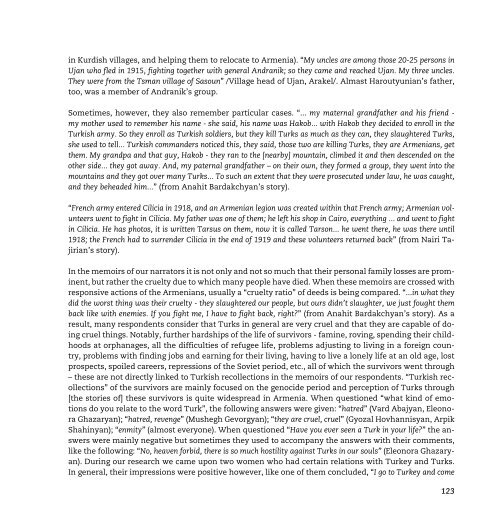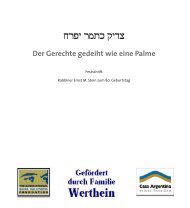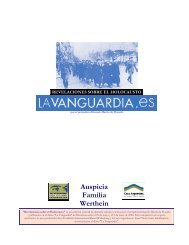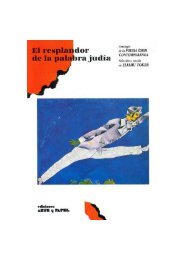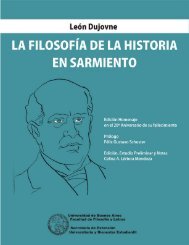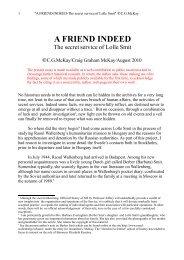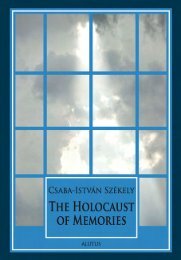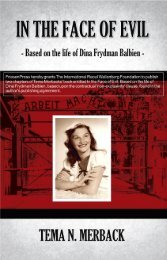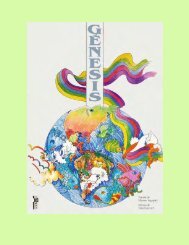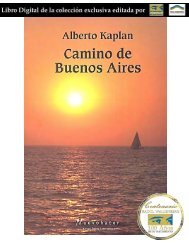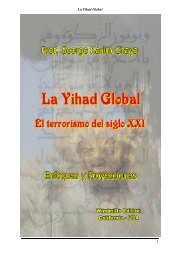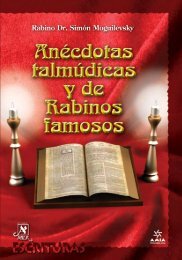“<strong>The</strong>y Lost No Less Than we Did, and That is True”“I watched lots of Turkish movies... Some 150-200 perhaps... <strong>The</strong>ir Turkish movies are picturing their real life. <strong>The</strong>yhave also suffered a lot, do you know what they had <strong>to</strong> withstand? Famine, massacres, along with massacres theyalso lost [people], they lost no less than we did, and that is true” (from Anahit Bardakchyan’s s<strong>to</strong>ry).Out of the 35 interviews that we conducted, this is the only generalized perception of Turks which is acquiredfrom Turkish movies. Those respondents whose “Turkish impressions” were acquired from the“Turkish experience” of their family members have no specific or generalized impressions on Turkey orTurks on issues which are not related <strong>to</strong> the destiny of Armenians. At the same time these people eitherdo not know, or do not tell, or, in their biographies there were no cases of any improper actions of Armenians(or members of their families) against a Turkish person or Turks in general. <strong>The</strong> only memory ofimproper actions of Armenian/Armenians was present in Almast Haroutyunian’s s<strong>to</strong>ry, and this ratherapplies <strong>to</strong> Kurds. She remembers particularly a s<strong>to</strong>ry by her father, when a group of Armenian survivorswho reached Moush killed one of the two Kurds [who delivered them (?)] and the other one was rescuedfrom being murdered by their village priest. “Well, so there are bad [people] also among Armenians”, concludesthe narra<strong>to</strong>r. <strong>The</strong> same Almast Haroutyunian tells that at a later point, when one Kurdish personwho settled in Armenia with Armenians was ill, she went <strong>to</strong> her brother, who was a doc<strong>to</strong>r, and askedhim <strong>to</strong> come and examine the patient, but her brother refused saying that the Kurds murdered so manyArmenians and that he is not going <strong>to</strong> treat a Kurd. “So, this was my brother, but that is no reason for me <strong>to</strong>hold my <strong>to</strong>ngue”.Memoirs about the resistance of Armenians or of them taking revenge are present in memoirs of ournarra<strong>to</strong>rs, though rarely. Mainly these aren’t memories from particular biographies of their families,but rather recollections of names of the Armenian freedom fighter groups in Van, or just the mentioningof Andranik’s name alone. Those few s<strong>to</strong>ries that were present in the family s<strong>to</strong>ries of our respondentsmainly refer, once again, <strong>to</strong> Andranik’s volunteer groups, like, for example, the case of GareginChugaszyan’s grandfather’s s<strong>to</strong>ry, who, coming back from the USA and finding out about the loss of hisfamily, joined Andranik’s troops. Aregnaz Poghosyan’s mother was a survivor, and later in Armenia shegot married <strong>to</strong> another survivor. Without any particular details, she knows that her father was fighting<strong>to</strong>gether with Andranik. “He was from Ishkhanadzor. He came here as Andranik’s soldier; his records show thathe was a soldier... He had a horse, a white horse. He used <strong>to</strong> tell “we were young”, he was telling this, that theywere fighting <strong>to</strong>gether with Andranik... <strong>The</strong>y were military, <strong>to</strong>gether with Andranik they were gathering these people,bringing them” (meaning that they were gathering Armenians who were hiding in the mountains or122
in Kurdish villages, and helping them <strong>to</strong> relocate <strong>to</strong> Armenia). “My uncles are among those 20-25 persons inUjan who fled in 1915, fighting <strong>to</strong>gether with general Andranik; so they came and reached Ujan. My three uncles.<strong>The</strong>y were from the Tsman village of Sasoun” /Village head of Ujan, Arakel/. Almast Haroutyunian’s father,<strong>to</strong>o, was a member of Andranik’s group.Sometimes, however, they also remember particular cases. “... my maternal grandfather and his friend -my mother used <strong>to</strong> remember his name - she said, his name was Hakob... with Hakob they decided <strong>to</strong> enroll in theTurkish army. So they enroll as Turkish soldiers, but they kill Turks as much as they can, they slaughtered Turks,she used <strong>to</strong> tell... Turkish commanders noticed this, they said, those two are killing Turks, they are Armenians, getthem. My grandpa and that guy, Hakob - they ran <strong>to</strong> the [nearby] mountain, climbed it and then descended on theother side... they got away. And, my paternal grandfather – on their own, they formed a group, they went in<strong>to</strong> themountains and they got over many Turks... To such an extent that they were prosecuted under law, he was caught,and they beheaded him...” (from Anahit Bardakchyan’s s<strong>to</strong>ry).“French army entered Cilicia in 1918, and an Armenian legion was created within that French army; Armenian volunteerswent <strong>to</strong> fight in Cilicia. My father was one of them; he left his shop in Cairo, everything ... and went <strong>to</strong> fightin Cilicia. He has pho<strong>to</strong>s, it is written Tarsus on them, now it is called Tarson... he went there, he was there until1918; the French had <strong>to</strong> surrender Cilicia in the end of 1919 and these volunteers returned back” (from Nairi Tajirian’ss<strong>to</strong>ry).In the memoirs of our narra<strong>to</strong>rs it is not only and not so much that their personal family losses are prominent,but rather the cruelty due <strong>to</strong> which many people have died. When these memoirs are crossed withresponsive actions of the Armenians, usually a “cruelty ratio” of deeds is being compared. “...in what theydid the worst thing was their cruelty - they slaughtered our people, but ours didn’t slaughter, we just fought themback like with enemies. If you fight me, I have <strong>to</strong> fight back, right?” (from Anahit Bardakchyan’s s<strong>to</strong>ry). As aresult, many respondents consider that Turks in general are very cruel and that they are capable of doingcruel things. Notably, further hardships of the life of survivors - famine, roving, spending their childhoodsat orphanages, all the difficulties of refugee life, problems adjusting <strong>to</strong> living in a foreign country,problems with finding jobs and earning for their living, having <strong>to</strong> live a lonely life at an old age, lostprospects, spoiled careers, repressions of the Soviet period, etc., all of which the survivors went through– these are not directly linked <strong>to</strong> Turkish recollections in the memoirs of our respondents. “Turkish recollections”of the survivors are mainly focused on the genocide period and perception of Turks through[the s<strong>to</strong>ries of] these survivors is quite widespread in Armenia. When questioned “what kind of emotionsdo you relate <strong>to</strong> the word Turk”, the following answers were given: “hatred” (Vard Abajyan, EleonoraGhazaryan); “hatred, revenge” (Mushegh Gevorgyan); “they are cruel, cruel” (Gyozal Hovhannisyan, ArpikShahinyan); “enmity” (almost everyone). When questioned “Have you ever seen a Turk in your life?” the answerswere mainly negative but sometimes they used <strong>to</strong> accompany the answers with their comments,like the following: “No, heaven forbid, there is so much hostility against Turks in our souls” (Eleonora Ghazaryan).During our research we came upon two women who had certain relations with Turkey and Turks.In general, their impressions were positive however, like one of them concluded, “I go <strong>to</strong> Turkey and come123
- Page 2 and 3:
Published by:Institut für Internat
- Page 5 and 6:
ContentsForeword...................
- Page 7 and 8:
ForewordThe project “Adult Educat
- Page 10 and 11:
Aras, Yasin Aras, Welat Ay, Cenk Ce
- Page 12 and 13:
The main audience of this book is o
- Page 15 and 16:
“Wish they hadn’t left”:The B
- Page 17 and 18:
ed by 1915 and where memories of Ar
- Page 19 and 20:
1915 tends to be represented by int
- Page 21 and 22:
Yet to a large extent, Turkish inte
- Page 23 and 24:
this, we can’t. It’s impossible
- Page 25 and 26:
een very advanced in trade and craf
- Page 27 and 28:
How to Come to Terms with Phantom P
- Page 29 and 30:
It is always you who has to be nice
- Page 32 and 33:
to the way he was raised: “They f
- Page 34 and 35:
empathize with Armenians: “My aun
- Page 36 and 37:
Adil is not the only one marked by
- Page 38 and 39:
ness may be an attempt to overcome
- Page 40 and 41:
dernity and the oral transmission o
- Page 42 and 43:
A soup pot with spoons around itAt
- Page 44 and 45:
What if My Mother is Armenian?Ruhi
- Page 46 and 47:
If I were younger I’d get baptize
- Page 48:
with butter. We’ll serve the impo
- Page 51 and 52:
The time Salih and Gavrik are worki
- Page 53 and 54:
Turkey’s changing context is refr
- Page 55 and 56:
‘It was to be expected.’ And my
- Page 57 and 58:
against one another. The feet of th
- Page 59 and 60:
Fear of Losing a CityZübeyde was b
- Page 61 and 62:
half for me.’ But what do our Mus
- Page 63 and 64:
e discussed when the kids were arou
- Page 65 and 66:
possible by the difference in relig
- Page 67 and 68:
The Charm of AraratMehmet is a 62-y
- Page 69 and 70:
dogs protected the sheep against wo
- Page 71 and 72: The Story of the “Night People”
- Page 73 and 74: “I don’t know why, but my grand
- Page 75: Research in Armenia:“Whom to Forg
- Page 78 and 79: and can generally be located in Tur
- Page 80 and 81: “Whom to Forgive? What to Forgive
- Page 82 and 83: “Private Stories”After the esta
- Page 84 and 85: Recalling MemoriesOral history diff
- Page 86 and 87: In the village of Ujan, where the v
- Page 88 and 89: The home-museum of Gevork Chaush in
- Page 90 and 91: Memorial in the Ashnak village dedi
- Page 92 and 93: other regions are entirely populate
- Page 94 and 95: sources and materials for their mem
- Page 96 and 97: Ergir’s Soil is Strong, Ergir’s
- Page 98: Tatevik, the granddaughterof Mihran
- Page 101 and 102: eral meanings in Armenian -”whole
- Page 103 and 104: The Gospel with Golden Binding of S
- Page 105 and 106: keeps a copper chalice that was bro
- Page 107 and 108: In some families the passports of t
- Page 109 and 110: at that time, Mustafa and Jamal, wh
- Page 111 and 112: People were so frightened to lose g
- Page 113 and 114: naked, they were decapitating every
- Page 115 and 116: Water, Fire, Desert“There was an
- Page 117 and 118: his mother dragged him behind her,
- Page 119 and 120: Many of our narrators mention the R
- Page 121: In the word-stock of the survivors
- Page 125 and 126: “Well, They Are Human Too”Even
- Page 127 and 128: member this well, they said, the el
- Page 129 and 130: speak to each other. Questioned by
- Page 131 and 132: Hamze Ptshuk, survived from Hosnut
- Page 133 and 134: “I don’t Know...”Why did this
- Page 135 and 136: “My Dear Almast, Write it Down, W
- Page 137 and 138: took his rifle and ran. The dog fel
- Page 139 and 140: she didn’t tell it to me. In the
- Page 141 and 142: elder guy in this house died and hi
- Page 143 and 144: AH - Turks always killed to get int
- Page 145 and 146: “My Father used to Tell us at Hom
- Page 147 and 148: person... I have never seen him, bu
- Page 149 and 150: gotten what you knew”. So, out of
- Page 151 and 152: a paid Adult Residential Facility,
- Page 153 and 154: It was probably after 60s... My fat
- Page 155 and 156: the Vardevar 1 day . Even if we mak
- Page 157 and 158: that this wasn’t a dream... and..
- Page 159 and 160: was our historical village. Nich, I
- Page 161 and 162: just filming around myself with no
- Page 163 and 164: that person whether I could take a
- Page 165: [Turk. wife]”. In the morning I t
- Page 168 and 169: 4 Albert Mamikonyan,1953, in Kirova
- Page 170 and 171: 11 Almast Harutyunyan,1920, Ujan vi
- Page 172 and 173:
18 Eleonora Ghazaryan.1949, Ashnak
- Page 174 and 175:
26 Nairi Tajiryan,1936, Egypt (Cair
- Page 176:
33 Vazgen Ghukasyan,1933, Ashnak vi


